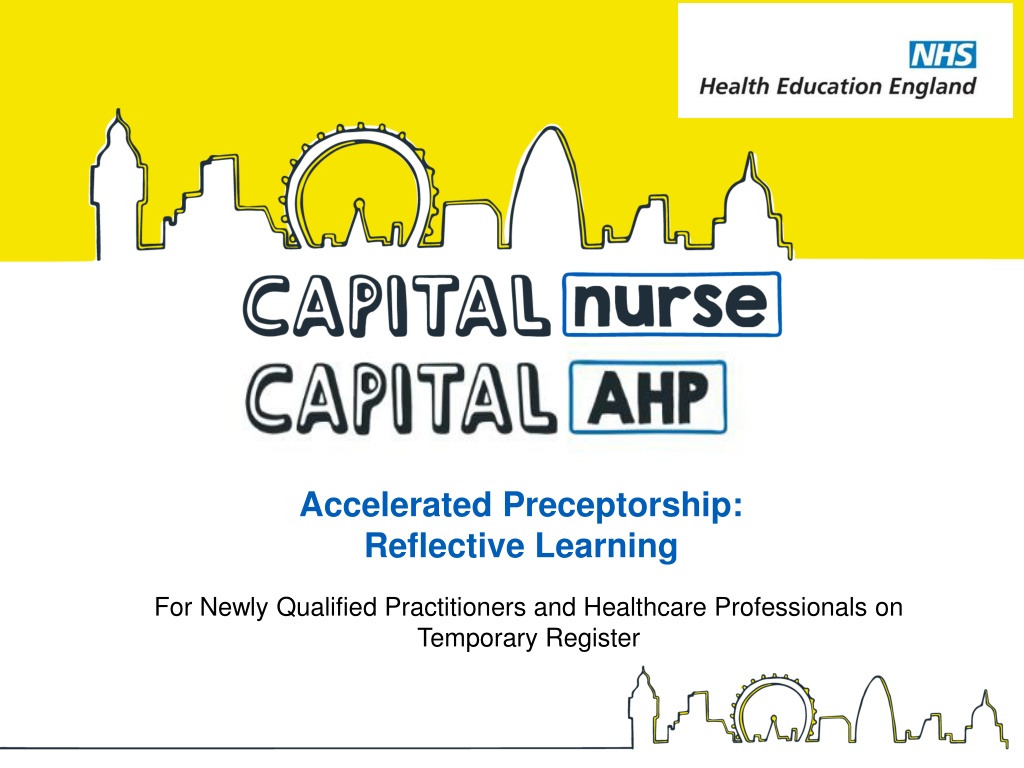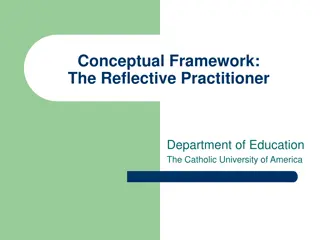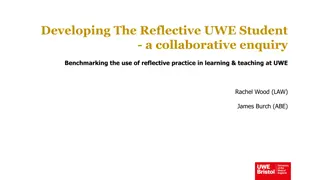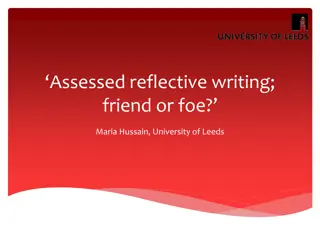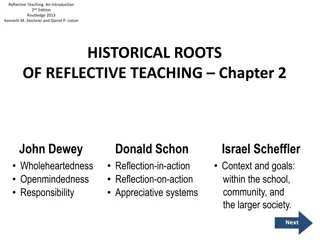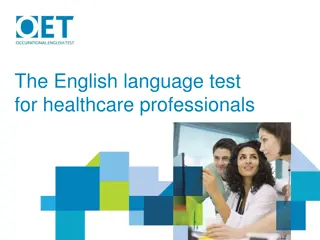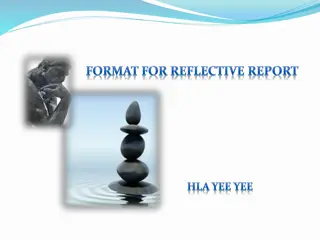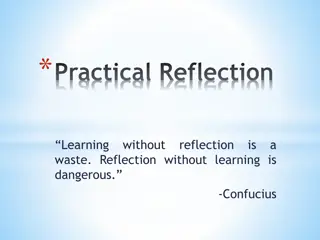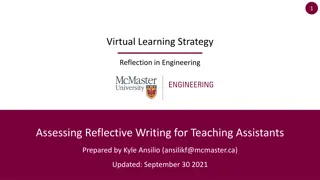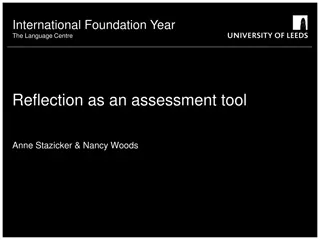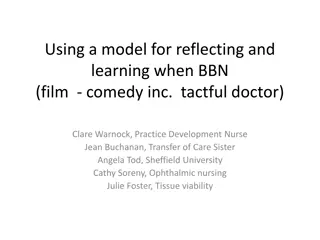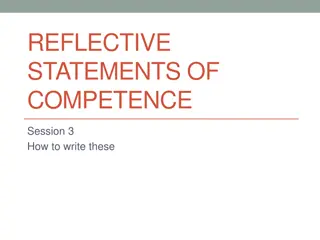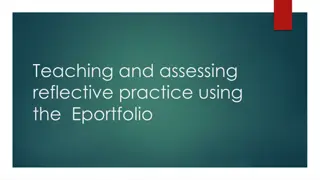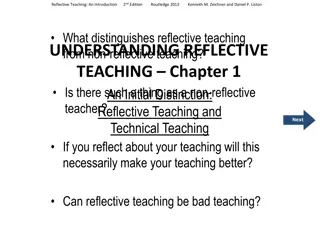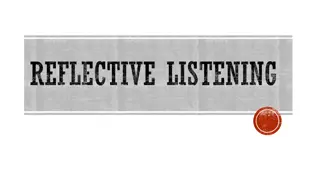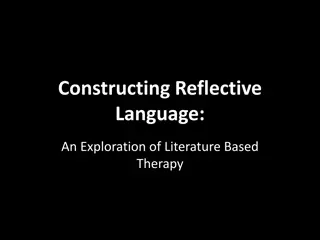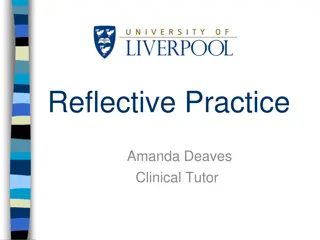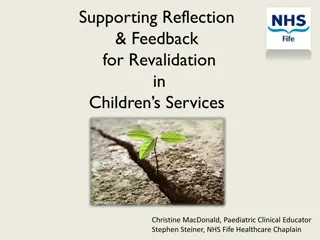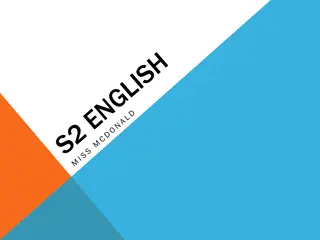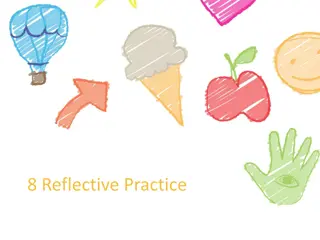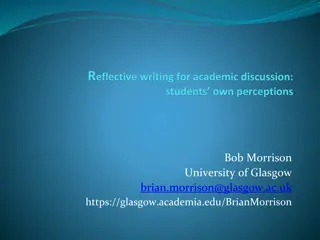Understanding Reflective Learning for Healthcare Professionals
Reflective learning is an essential tool for healthcare practitioners, allowing for the critical analysis of experiences to facilitate deeper understanding and growth. This practice involves looking back, learning from past experiences, and finding new ways to enhance skills and confidence. Kolb's Learning Cycle provides a framework for experiential learning, emphasizing the importance of reflection, analysis, and active experimentation to improve professional practice.
Download Presentation

Please find below an Image/Link to download the presentation.
The content on the website is provided AS IS for your information and personal use only. It may not be sold, licensed, or shared on other websites without obtaining consent from the author. Download presentation by click this link. If you encounter any issues during the download, it is possible that the publisher has removed the file from their server.
E N D
Presentation Transcript
Accelerated Preceptorship: Reflective Learning For Newly Qualified Practitioners and Healthcare Professionals on Temporary Register CapitalNurse is jointly sponsored by Health Education England, NHS England and NHS Improvement
Session Objectives By the end of this session you will: Understand the theory of reflective learning Be aware of the value of reflective learning Develop awareness of Gibbs and Rolfe et al as reflective learning tools Understand the impact of reflective learning on your learning journey
What is Reflective Learning? Reflective learning evolves from the reflection and critical analysis of experience from professional practice. It facilitates the learning process by providing a deeper understanding of yourself In simple terms it is the consideration at the end of a day of how the day went, what went well and what didn t, what you have learned.
Reflective Learning Reflective learning helps us to look back, consider what we have done, how we have done it and to learn from the experience Through the reflection we can find new ways of doing things, grow and move forward with increased confidence and competence.
Kolbs learning cycle In the 1980s, David Kolb developed a model of learning considered as experiential learning which begins with a concrete experience and learning takes place through a further three stages of reflection, analysis and evaluation. This then leads on to a new experience from the learning and the cycle begins again. His work emphasised the importance of reflecting on experience, theorising to change approaches and use experience as a learning tool. Peter Honey and Thomas Mumford developed Kolb s learning cycle further to identify four different learning styles and show that as individuals we have preferred ways of learning
Kolbs Learning Cycle A new situation or experience which provokes a reaction and begins the learning experience The final stage as we test our hypothesis with a new experience or situation which incorporates our learning Concrete Experience Active Reflection experimentation The second stage during which we review our experience, think about what we have done and how we have felt Abstract During the third stage we begin to interpret and analyse the experience and develop a hypothesis conceptualisation
Kolb in Practice Experience Describe the experience, what happened, when and where. What was the impact? Reflection How did you feel? How did you behave? What were your thoughts? Theorising Could the outcome have been different? What theories can you apply? What could you have done differently? Experimentation What will you do differently next time? What do you think the result will be?
What stops us? There are road blocks which hinder our reflective learning and these include: Lack of time Workload pressures Stress Emotional and mental exhaustion Focus on the negative aspects we can learn just as much from positive experiences
Learning to reflect Reflection doesn t need to be onerous or time-consuming. If we learn to reflect using a model we understand, it becomes an automatic habit at the end of the day and in addition to being a learning technique, it can help us to accept the day, clear the mind and leave work at work. Reflecting with someone else eg your preceptor, supervisor or peer, may help with stages of reflection you find more difficult A reflective journal can help you to articulate your reflection and learning. It also provides a document for you to look back on and continue to learn from. Using a model will help you to structure your reflections in a meaningful way
Models of Reflection There are different models of reflection and the two most popular ones in healthcare are: Gibbs (1988) focuses on six different stages which were intended to promote deep reflection, isolating feelings and slowing down the thought processes so that reflectors avoid jumping to conclusions Rolfe et al (2001) a simple reflection model with just three questions what, so what and now what? Whilst simple, it is very effective and can be used as the basis of reflective coaching to encourage learners and newly registered practitioners to think through the reflection process and come up with an action plan
Gibbs Model Description what happened with as much detail as possible 1 How did you feel? consider emotional response, how you reacted and how others reacted to you 2 Evaluation good and bad. Consider the situation / experience, be objective and begin to make value judgements 3 Analysis and comparison. What sense can you make of the experience? Was yours the same as others? You may want to involve others 4 Conclusion what have you learned and what could you have done differently? 5 Action what will you do next time? Consider a simple action plan based on your learning 6
Activity Take a few minutes to consider a recent experience during your accelerated preceptorship and using Gibbs model of reflection, work through the different stages Once you ve finished, consider how you found the model. Did it help you to structure your reflection? How did it help you grow and develop?
Rolfe et al - Model WHAT: Is the problem / situation? Was my role? Was I trying to achieve? Actions did I take? Was response of others? Were the consequences? Were my feelings? Was good or bad about the experience SO WHAT? Does this teach me? Does this mean to me and to others? Could I have done differently? Knowledge or skills did I bring to the situation? Is my understanding on the situation and my actions now? Could I have done differently? NOW WHAT? Do I need to do to make things better? Broader issues need to be considered? Might the consequences be? Will I do differently next time?
Activity Now consider a different recent experience during your accelerated preceptorship using the Rolfe et al model of reflection work through the different stages Once you ve finished, consider how you found the model. Did it help you to structure your reflection? How did it help you grow and develop? Which model, Gibbs or Rolfe, did you find suited you best? Why do you think this was so?
Activity Using the model you prefer, reflect on your learning during your accelerated preceptorship, what you have achieved and where you may still need to develop Consider one area for development which you want to prioritise
SMART Objectives Specific clear, concise and specific Measureable how objective may be measured and what success looks like Achievable / Agreed achievable within any constraints for the individual and agreed by the individual Realistic / Relevant realistic in terms of method, timing and constraints. Relevant in terms of the individual, their learning needs and role requirements Timebound a defined deadline for completion. Whilst we may not like deadlines, we focus on achieving by a deadline
Activity Set yourself one or two SMART development objectives for the next three months indicating any support you will need
References Kolb, D.A. (1984). Experiential learning: experience as the source of learning and development. Englewood Cliffs, NJ: Prentice Hall Gibbs, G. (1988) Learning by Doing: A guide to teaching and learning methods. Further Education Unit, Oxford Brookes University, Oxford Rolfe, G., Freshwater, D. and Jasper, M. (2001). Critical reflection in nursing and the helping professions: a user s guide. Basingstoke: Palgrave Macmillan
Acknowledgments Desiree Cox, Preceptorship Project Manager, CapitalNurse Jules Marchant, Therapy Practice Development Lead, Guy s and St Thomas NHS Trust, and Health Education England RePAIR Fellow Catherine DesForges, Head of Education and Development for AHPs, Royal Free London NHS Trust Pan-London Mental Health Allied Health Professionals Preceptorship Programme by Oxleas NHS Foundation Trust
